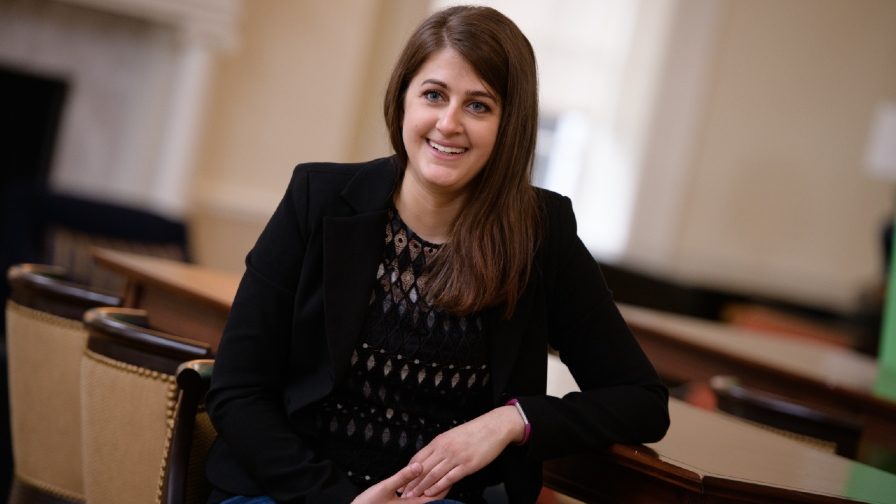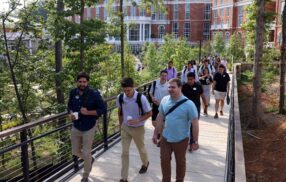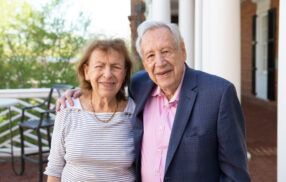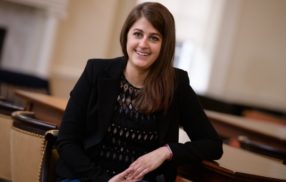
‘She Came and Moved Mountains’: UVA Darden Professor Kinda Hachem
By Simon Constable
When Professor Kinda Hachem first joined the University of Virginia Darden School of Business faculty in 2018, she got hit with a bit of culture shock.
But like anyone who has lived in multiple countries, she embraced a new way of doing things at work and home. Better still, she quickly came to love her new life and the people in it. Her colleagues have seen the change. “Darden is like a family,” says Professor Elena Loutskina, a close colleague of Hachem’s. “She just realized how great it is to be a part of that.”
Born in Belgium, Hachem’s parents moved with her to Toronto when she was three. She worked as a student analyst at RBC Financial Group throughout her undergraduate studies, then as a staff economist at Canada’s central bank before completing a Ph.D. at the University of Toronto and earning her first academic appointment at the University of Chicago’s Booth School of Business. Two years ago, Darden recruited her to join the faculty as an associate professor in the Global Economies and Markets area.
At first, Hachem was doubtful when a colleague insisted that lunching with students was important for faculty. “I thought, ‘Why would students want to have lunch with their professor?’” she says. “To me, that was a foreign concept.” At many other universities, there is a firm social barrier between the faculty and the students.
Of course, Darden graduates know that the learning process at the graduate school doesn’t just take place in a formal lecture hall. They also know it isn’t a one-way dialogue between the professor and students. Unstructured social events, where a wide variety of ideas and experiences get exchanged for the benefit of all, are essential also. “She did not initially fully understand why we teach the way we teach,” says Loutskina. In short, it wasn’t clear why such events would be valuable both for her and the students. However, it wasn’t long before Hachem’s view changed, and a metaphorical lightbulb lit up.
Despite her initial skepticism, Hachem attended the lunch, where she met students with a wide variety of backgrounds from business and consulting to the military and the public sector. The group discussed Hachem’s research interests in banking and what students had done pre-Darden. “The lunch was like a conversation with a group of friends,” she says. “Friends you’d choose if you could choose from anyone in the world. After that, I remember thinking, ‘Now I get it.’”
The ‘Applied Theorist’ Examining Regulation’s Unintended Consequences
When not teaching, Hachem focuses her research on the interplay between money, banking and the economy. “I view myself as an applied theorist,” she says. That approach means going beyond building simple financial models. She doesn’t assume that everything in the economy will stay the same if the government changes its policies or rules. Put simply, if the government pushes one lever, what levers do businesses and individuals push or pull in response? And then, will those responses lead to an undesired outcome? “I find unintended consequences fascinating to study and learn from,” she says.
Hachem’s interest in the unintended consequences of policy decisions was piqued as a Ph.D. student during the 2007–09 global financial collapse. She wondered: How could such a “massive meltdown” occur in the U.S., which has some of the best monetary and financial authorities in the world?
Then a few years later, after reading a series of articles on China’s shadow banking system in the Financial Times, Hachem decided to delve even deeper into the matter. Shadow banks are lenders that generally work outside a country’s stricter banking regulations. They exist in most countries, including the U.S. The result of her study was a new research agenda and a review article in the 2018 Annual Review of Financial Economics titled “Shadow Banking in China.” Many of the findings were summarized in a recent article on Darden Ideas to Action.
The Darden Dynamo Who ‘Moved Mountains’
While Darden has quickly changed Hachem, she’s done the same in return. At breakneck speed, she developed and rolled out a new elective course on monetary policy and financial stability. “We probably introduce two to three new electives a year, but for someone to introduce one after a year at Darden, that’s very uncommon,” Loutskina says. “She is a dynamo who came and moved mountains.”
That dedication to helping others learn goes farther than it would with many professors. When she left Booth to come to Darden, she offered to continue advising her teaching assistant, Luis Simon, in his Ph.D. work while he stayed in Chicago.
“It was more than I could have expected,” Simon says. Of course, he accepted her offer. He’d already benefited from Hachem’s approach to supervising. Not only did he get guidance at scheduled supervision appointments, but she’d contact him via email in between as well when useful thoughts came up. “She seemed actually to care how things ended up, and I don’t think that’s true of all professors,” he says.
When Hachem isn’t working, she keeps herself busy with a couple of hobbies. One is learning to cook, which also helps free her mind of work-related matters. “I still have only novice kitchen skills so it would be dangerous to be distracted,” she says. “Everything is off the table except what I am actually doing.”
The other pastime is a newfound love of basketball, which came by a circuitous route. She learned fast that in Virginia, hockey doesn’t just mean ice hockey as it does in Toronto, where she spent much of her life. “Having to clarify that I wasn’t talking about field hockey, that was a new one for me,” Hachem says.
In an area less passionate about hockey, she’s become an avid fan of her former hometown basketball team, the Toronto Raptors, which won the NBA Championship in 2019.
“That’s how I decompress,” she says. “I’ll still watch the occasional Toronto Maple Leafs game, but, in more ways than one, moving to Charlottesville has been transformational.”
The University of Virginia Darden School of Business prepares responsible global leaders through unparalleled transformational learning experiences. Darden’s graduate degree programs (MBA, MSBA and Ph.D.) and Executive Education & Lifelong Learning programs offered by the Darden School Foundation set the stage for a lifetime of career advancement and impact. Darden’s top-ranked faculty, renowned for teaching excellence, inspires and shapes modern business leadership worldwide through research, thought leadership and business publishing. Darden has Grounds in Charlottesville, Virginia, and the Washington, D.C., area and a global community that includes 18,000 alumni in 90 countries. Darden was established in 1955 at the University of Virginia, a top public university founded by Thomas Jefferson in 1819 in Charlottesville, Virginia.
Press Contact
Molly Mitchell
Associate Director of Content Marketing and Social Media
Darden School of Business
University of Virginia
MitchellM@darden.virginia.edu







